Mises, Ludwig von. Human Action: A Treatise on Economics
Подождите немного. Документ загружается.

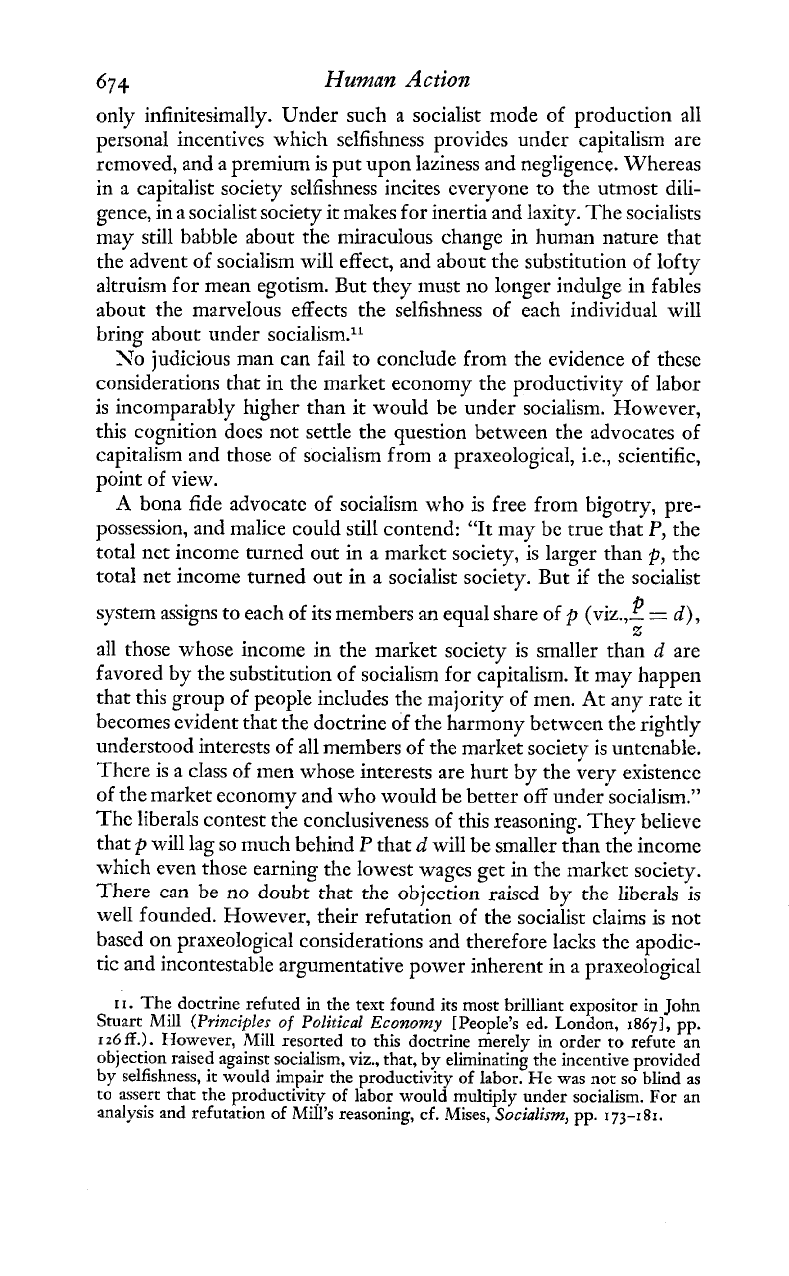
674
Human
Action
only infinitesimally. Under such a socialist mode of production all
personal incentives which selfishness provides under capitalism are
removed, and a premium is put upon laziness and negligence. Whereas
in a capitalist society sclfishness incites everyone to the utmost dili-
gence, in a socialist society
it
makes for inertia and laxity. The socialists
may still babble about the miraculous change in human nature that
the advent of socialism will effect, and about the substitution of lofty
altruism for mean egotism. But they must no longer indulge in fables
about the marvelous effects the selfishness of each individual will
bring about under socialism.ll
90
judicious man can fail to conclude from the evidence of these
considerations that in the market economy the productivity of labor
is incomparably higher than it would be under socialisn~. However,
this cognition does not settle the question between the advocates of
capitalism and those of socialism from a praxeological, i.e., scientific,
point of view.
A
bona fide advocate of socialism who is free from bigotry, pre-
possession, and malice could still contend: "It may bc true that
P,
the
total net income turned out
in
a market society, is larger than
p,
the
total net income turned out in a socialist society. But if the socialist
system assigns to each of its members an equal share of
p
(vis,?
=
d),
Z
all those whose income in the market society is smaller than
d
are
favored by the substitution of socialism for capitalism. It may happen
that this group of people includes the majority of men. At any rate it
becomes evident that the doctrine of the harmony between the rightly
understood interests of all members of the market society is untenable.
There is a class of men whose interests are hurt by the very existence
of the market economy and who would be better off under socialism."
The liberals contest the conclusiveness of this reasoning. They believe
that
p
will lag so much behind
P
that
d
will be smallcr than the income
which even those earning the lowest wagcs get in the markct society.
There
can
be
nc
d~ub:
:ha:
the
ol-,)ec:ion
raised
by
the liberals is
well founded. However, their refutation of the socialist claims is not
based on praxeological considerations and therefore lacks the apodic-
tic and incontestable argumentative power inherent in a praxeological
I
I.
The doctrine refuted
in
the text found its most brilliant expositor in John
Stuart Mill
(Principles of Political Economy
[People's ed. London,
18671,
pp.
I
26
ff.).
However, Mill resorted to this doctrine merely in order to refute an
objection raised against socialism, viz., that, by eliminating the incentive provided
by selfishness, it would impair the productivity of labor. He was not so blind as
to assert that the productivity of labor would multiply under socialism. For an
analysis and refutation of Mill's reasoning, cf. Mises,
Socialism,
pp.
173-181.
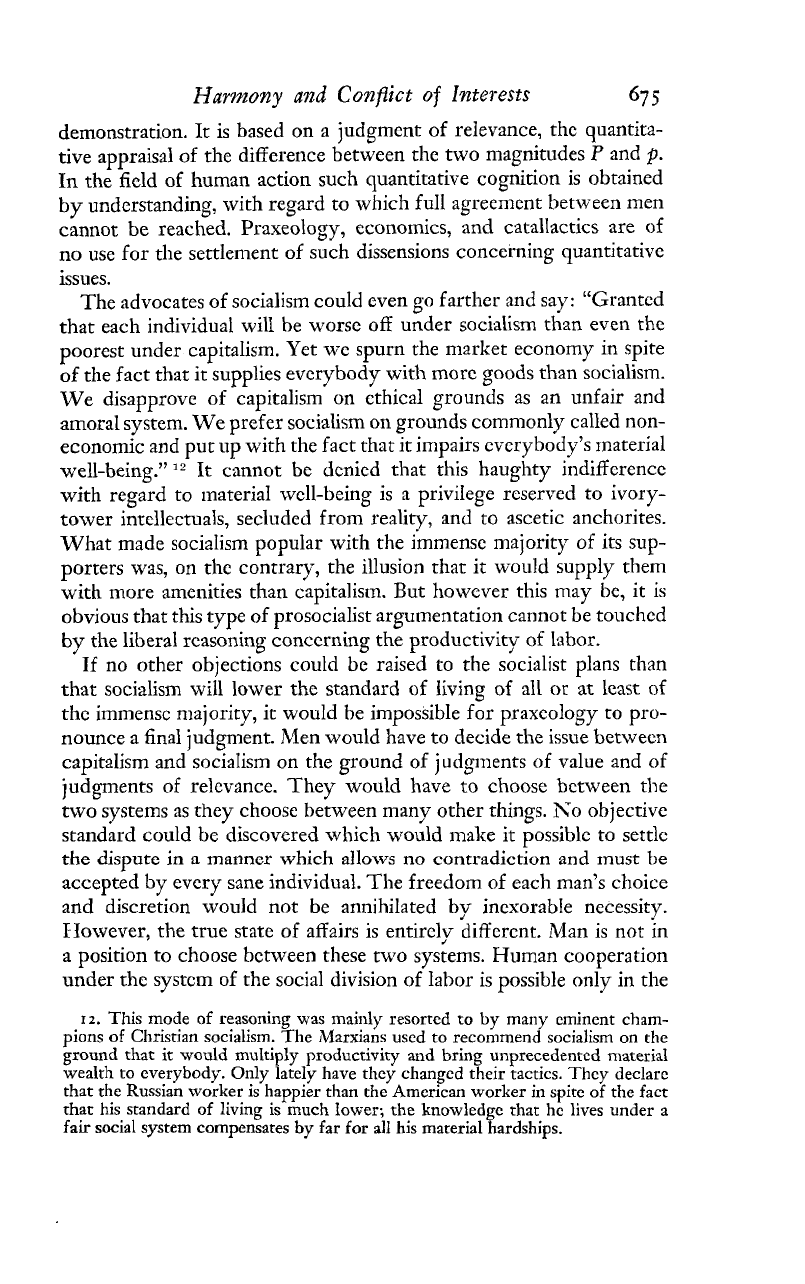
Harmony
and
Conffict
of
Interests
67
5
demonstration.
It
is based on a judgment of relevance, the quantita-
tive appraisal of the difference between the two magnitudes
P
and
P.
In the field of human action such quantitative cognition is obtained
by understanding, with regard to which full agreerncnt between men
cannot be reached. Praxeology, economics, and catallactics are of
no use for the settlement of such dissensions concerning quantitative
issues.
The advocates of socialism could even go farther and say: "Granted
that each individual will be worse off under socialism than even the
poorest under capitalism. Yet we spurn the market economy in spite
of the fact that it supplies everybody with more goods than socialism.
We disapprove of capitalism on ethical grounds as an unfair and
amoral system. We prefer socialism on grounds commonly called non-
economic and pur up with the fact that it impairs cvcrybody's material
well-being."12 It cannot be denied that this haughty indifference
with regard to material wcll-being is a privilege reserved to ivory-
tower intellectuals, secluded from reality, and to ascetic anchorites.
What made socialism popular with the immense majority of its sup-
porters was, on the contrary-, the illusion that it would supply them
with more amenities than capitalism. But however this may be, it is
obvious that this type of prosocialist argumentation cannot be touched
by the liberal reasoning concerning the productivity of labor.
If
no other objections could be raised to the socialist plans than
that socialism will lower the standard of living of all or at least of
the immensc majority, it would be impossible for praxeology to pro-
nounce a final judgment. Men would have to decide the issue betwecn
capitalism and socialism on the ground of judgments of value and of
judgments of relevance. They would have to choose between the
two systems as they choose between many other things. Xo objective
standard could be discovered which would make it possible to settle
the dispute in
a
manner which allows no contradiction and must be
accepted by every sane individual. The freedom of each man's choice
and discretion would not be annihilated by inexorable necessity.
Ilowever, the true state of affairs is entirely different. Man is
not
in
a position to choose between these two systems. Human cooperation
under the system of the social division of labor is possible only in the
12.
This mode of reasoning was ~nainly resorted to
by
many eminent cham-
pions
of
Christian socialism. The ~Marxians used to recommend socialism on the
ground that it would multiply productivity and bring unprecedented material
wealrh to everybody. Only lately have they changed their tactics. They declare
that rhe Russian worker is happier than the American worker in spite of the fact
that his standard of living is much lower; the knowledge that he lives under a
fair social system compensates
by
far for
all
his material hardships.
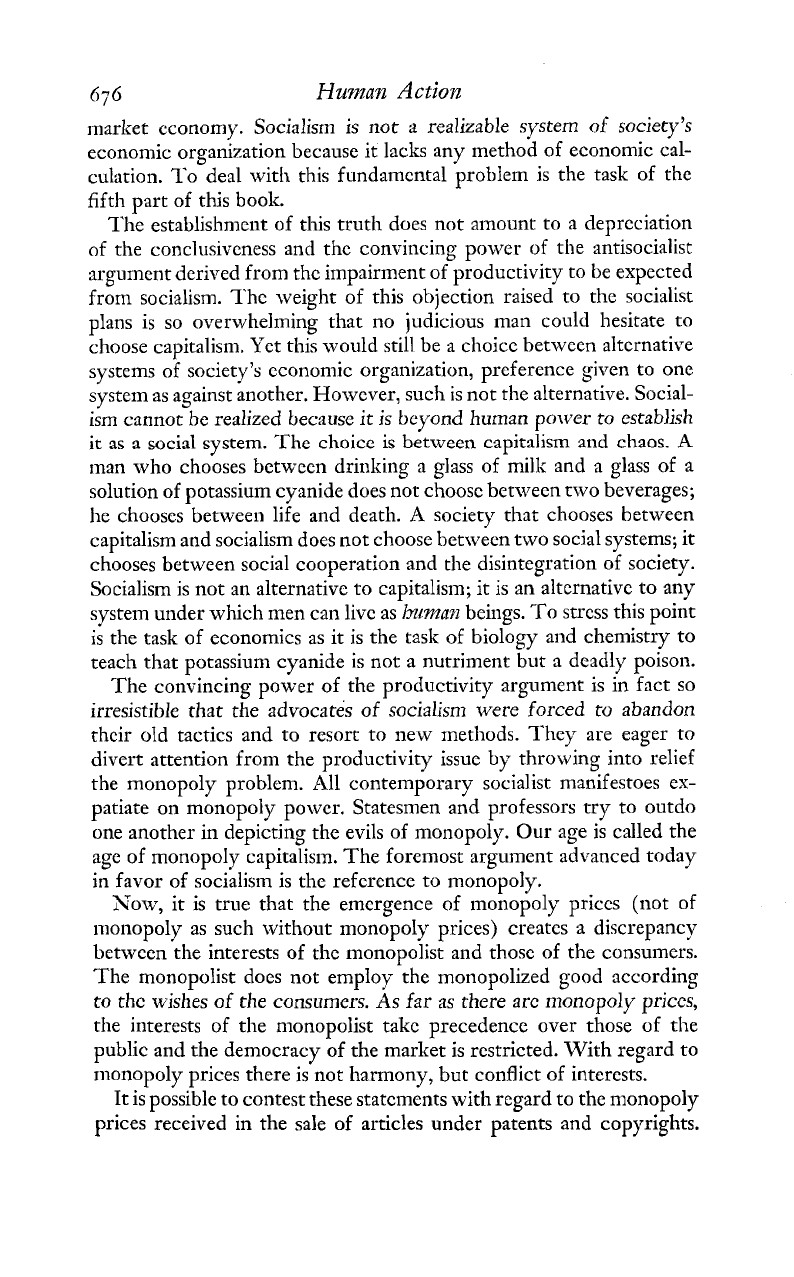
676
Human
Action
market cconorny. Socialism is not a realizable system
of
society's
econonlic organization becausc it lacks any method of economic cal-
culation. To deal with this
fundamental
problem is the task of the
fifth part of this book.
The
establishment
of this truth does not amount to a deprcciation
of the conclusiveness and the convincing power
of
the antisocialist
argument derived from thc impairment of productivity to be expected
from socialism. The weight of this objection raised to the socialist
plans is so overwhelming that no judicious man could hesitate to
choose capitalism. Yet this would still be a choicc between alternative
systems of society's econon~ic organization, prcference given to one
system as against another. Howcver, such is not the alternative. Social-
ism cannot he realized becausc it is beyond human
power
to establish
it
as a social system. The choice is between capitalism and chaos.
A
man who chooses betwecn drinking a glass of milk and a glass of a
solution of potassium cyanide does not choosc between two beverages;
he chooses between life and death.
A
society that chooses betwecn
capitalism and socialism does not choosc betwecn two social systems; it
chooses between social cooperation and the disintegration of society.
Socialism is not an alternativc to capitalism; it is an alternativc to any
system under which men can live as
lxw~an
beings.
To
strcss this point
is the task of economics as it is the task of biology and chemistry to
teach that potassium cyanide is not a nutriment but a deadly poison.
The convincing power of the productivity argument is in fact so
irresistible that the advocates of socialisnl were forced to abandon
their oId tactics and to resort to new methods. They are eager to
divert attention from the productivity issue by throwing into relief
the monopoly problem. All contemporary socialist manifestoes ex-
patiate on monopoly power. Statesmen and professors try to outdo
one another in depicting the evils of monopoly. Our age is called the
age of monopoly capitalism. The foremost argument advanced today
in favor of socialism is the refcrcnce to monopoly.
Xow, it is true that the emcrgence of monopoly priccs (not of
monopoly as such without monopoly prices) creates a discrepancy
bctwccn the interests of thc
monopolist
and thosc of the consumers.
The monopolist does not employ the monopolized good according
to thc wishes
of
the consumers. As far as there arc monopoly prices,
the interests of the monopolist takc precedence over those of the
public and the democracy of the market is restricted. With regard to
monopoly prices there is not harmony, but conflict of intercsts.
It is possible to contest these statcmcnts with regard to the monopoly
prices received in the sale
of
articles under patents and copyrights.
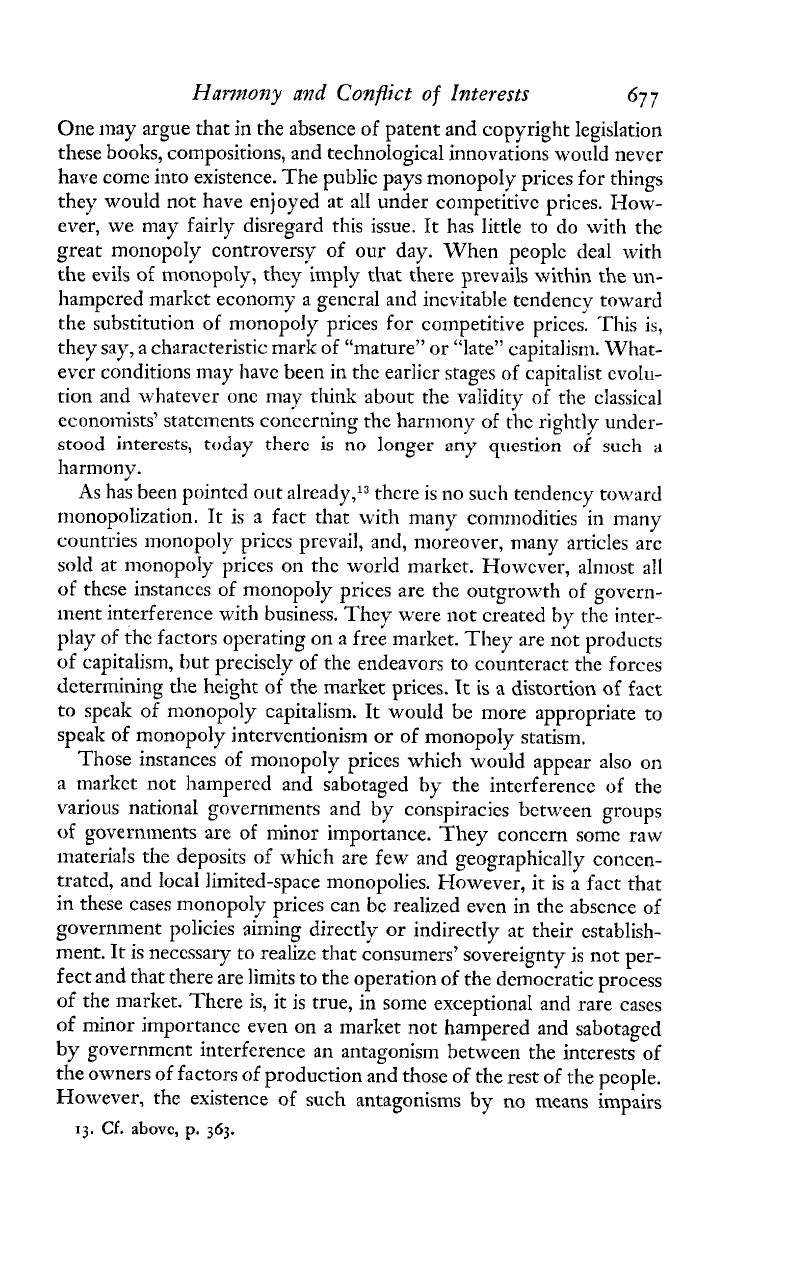
Harmony
and
Conflict
of
Interests
One may argue that in the absence of patent and copyright legislation
these books, compositions, and technological innovations would never
have comc into existence. The public pays monopoly prices for things
they would not have enjoyed at all under competitive prices. How-
ever, we may fairly disregard this issue. It has little to do with the
great monopoly controversy of our day. When peoplc deal with
the evils of
&;lopo~y,
they imply that there prevails
within
the
un-
hampered market economy a general and inevitable tendency toward
the substitution of monopoly prices for competitive prices. This is,
they say, a characteristic mark of "mature" or "late" capitalism. What-
ever conditions may have been in thc earlier stages
of
capitalist cvolu-
tion and whatever onc may think about the validity of the classical
economists' statements conccrning the harmony
of
the rightly under-
stood
interests,
today therc is
no
longer any question of such
;I
harmony.
As has been pointed out already,13 thcre is no such tendency toward
rnonopolization. It is a fact that with many commodities in many
countries monopoly prices prcvail, and, moreover, many articles are
sold at monopoly prices on thc world market. However, almost all
of
these instances of monopoly prices are the outgrowth of govern-
ment interference with business. Thcy were not created by thc inter-
play
of
the factors operating on a free market. They are not products
of capitalism, but
precisely
of the endeavors to countcract the forces
determining the height of the market prices.
Tt
is
a distortion of fact
to speak of monopoly capitalism. It would be more appropriate to
speak of monopoly interventionism or of monopoly statism.
Those instances of monopoly prices which would appear also on
a market not harnpercd and sabotaged by the interferencc of the
vario~~s national governments and by conspiracies between groups
of governments are of minor imporrance. They concern some raw
1nateriaIs the deposits of which are few and geographically concen-
trated, and local limited-space monopolies. However, it is a fact that
in these cases rnonopoly prices can bc realized even in the absence of
government policies aiming directly or indirectly at their establish-
ment. It is necessary to realizc that
consumers'
sovereignty is not per-
fect and that there are limits to the operation of the democratic process
of the market. There is, it is true, in some exceptionaI and rare cases
of minor
importance
even on a market not hampered and sabotaged
by government interference an antagonism between the interests of
the owners of factors
of
production and those of the rest of the people.
However, the existence of such antagonisms by no means impairs
13.
Cf.
above,
p.
363.
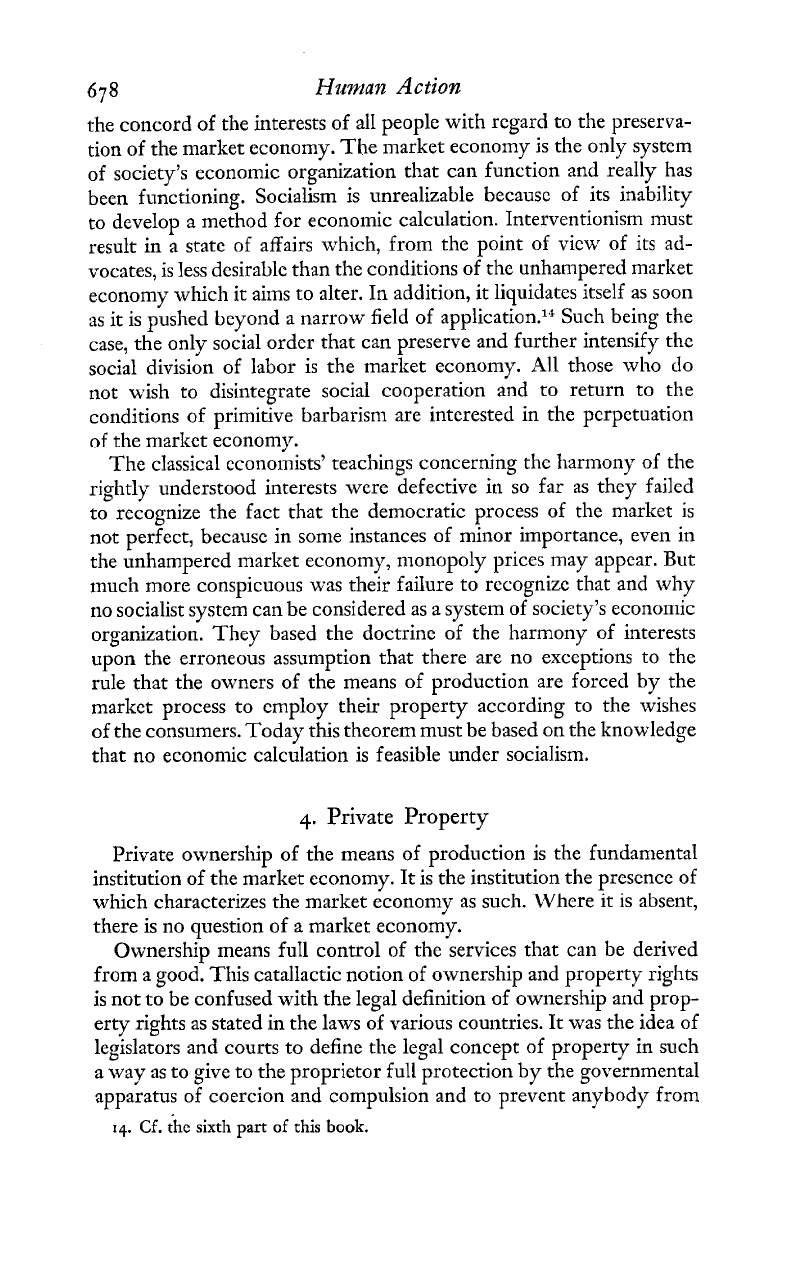
Human
Action
the concord of the interests of a11 people with regard to the preserva-
tion of the market economy. The market economy is the only system
of society's economic organization that can function and really has
been functioning. Socialism is unrealizable because of its inability
to develop a method for economic calculation. Interventionism must
result in a state of affairs which, from the point of view of its ad-
vocates, is less desirable than the conditions of the unhampered market
economy which it aims to alter. In addition, it liquidates itself as soon
as it is pushed beyond a narrow field of application.li Such being the
case, the only social order that can preserve and further intensify the
social division of labor is the market economy.
All
those who do
not wish to disintegrate social cooperation and to return to the
conditions of primitive barbarism are interested in the perpetuation
of
the market economy.
The classical economists' teachings concerning the harmony of the
rightly understood interests were defective in so far as they failed
to recognize the fact that the democratic process of the market is
not perfect, because in some instances of minor importance, even in
the unhampered market economy, nlonopoly prices may appear. But
much more conspicuous was their failure to recognize that and why
no socialist system can be considered as a system of society's economic
organization. They based the doctrine of the harmony of interests
upon the erroneous assumption that there are no exceptions to the
rule that the owners of the means of production are forced by the
market process to employ their property according to the wishes
of the consumers. Today this theorem must be based on the knowledge
that no economic calculation is feasible under socialism.
4.
Private Property
Private ownership of the means of production is the fundamental
institution of the market economy. It is the institution the presence of
which characterizes the market econonly as such. Where it is absent,
there is no question of a market economy.
Ownership means fuIl control of the services that can be derived
from a good. This catallactic notion of ownership and property rights
is not to be confused with the legal definition of ownership and prop-
erty rights as stated in the laws of various countries. It was the idea of
legislators and courts to define the legal concept of property in such
a way as to give to the proprietor full protection by the governmental
apparatus of coercion and compulsion and to prevent anybody from
14.
Cf.
;he
sixth
part
of
this
book.
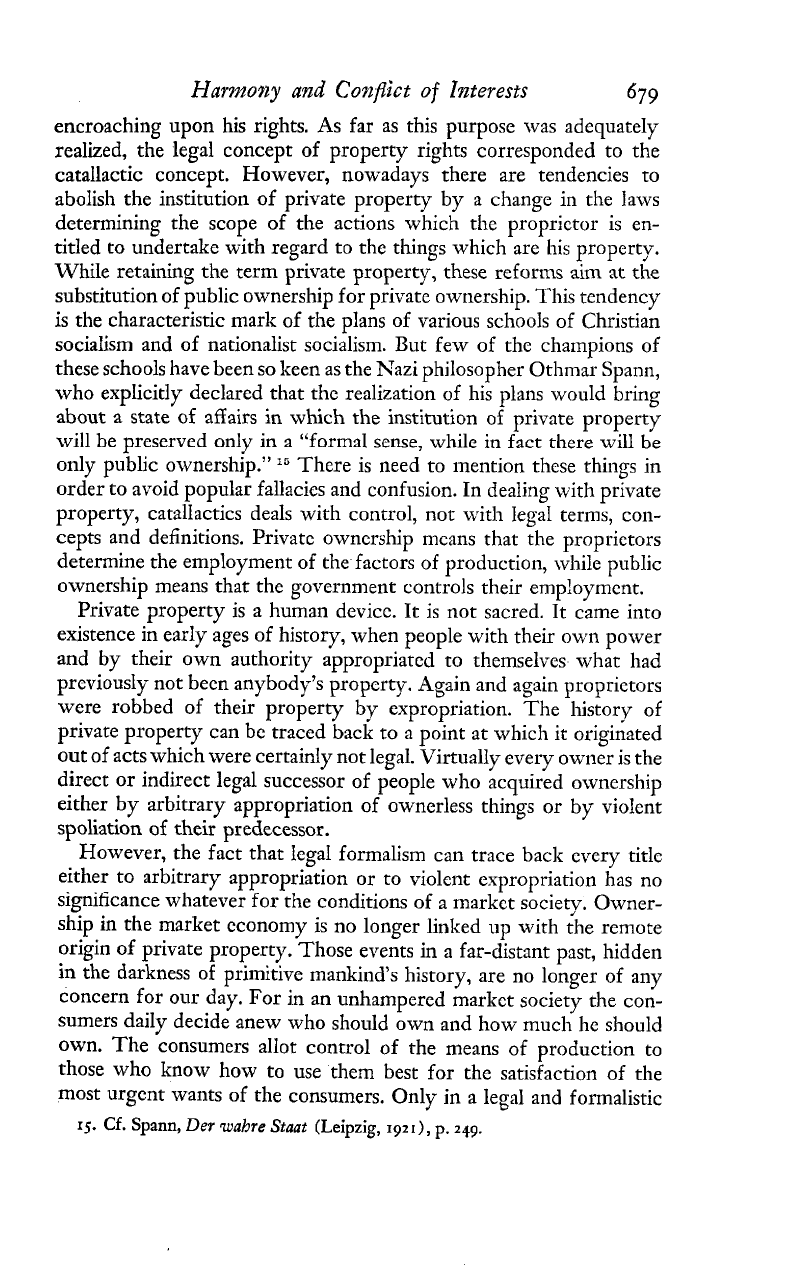
Harwiony and
Conflict
of
Interests
679
encroaching upon his rights. As far as this purpose was adequately
realized, the legal concept of property rights corresponded to the
catallactic concept. However, nowadays there are tendencies to
abolish the institution of private property by a change in the laws
determining the scope of the actions which the proprietor is en-
titled to undertake with regard to the things which are
his
property.
While retaining the term private property, these reforrns aim at the
substitution of public ownership for private ownership. This tendency
is the characteristic mark of the plans of various schools of Christian
socialism and of nationalist socialism. But few of the champions of
these schools have been so keen as the R'azi philosopher Othmar Spann,
who explicitly declared that the realization of his plans would bring
about a state of affairs in which the institution
of
private property
will be preserved only in a "formal scnse, while in fact there will be
only public ownership." =There is need to mention thcse things in
order to avoid popular fallacies and confusion. In dealing with private
property, catallactics deals with control, not with IegaI terms, con-
cepts and definitions. Private ownership means that the proprietors
determine the employment of the factors of production, while public
ownership means that the government controls their employment.
Private property is a human device. It is not sacred. It came into
existence in early ages of history, when people with their ow11 power
and by their own authority appropriated to themselves what had
previously not been anybody's propcrty. Again and again proprietors
were robbed of their property by expropriation. The history of
private property can be traced back to a point at which it origiiated
out of acts which were certainly not legal. Virtually every owner is the
direct or indirect legal successor of people who acquired ownership
either by arbitrary appropriation of ownerless things or by violent
spoliation of their predecessor.
However, the fact that legal formalism can trace back every title
either to arbitrary appropriation or to violent expropriation has no
significance whatever for the conditions of a markct society. Owner-
ship in the market economy is no longer linked
up
with the remote
origin of private property. Those events in a far-distant past, hidden
in the darkness of primitive mankind's history, are no longer of any
concern for our day. For in an unhampered market society the con-
sumers daily decide anew who should own and how much he should
own. The consumers allot control of the means of production to
those who know how to use them best for the satisfaction of the
most urgent wants of the consumers. Only in a legal and formalistic
15.
Cf.
Spann,
Der
wahre
Staat
(Leipzig,
1921),
p.
249.
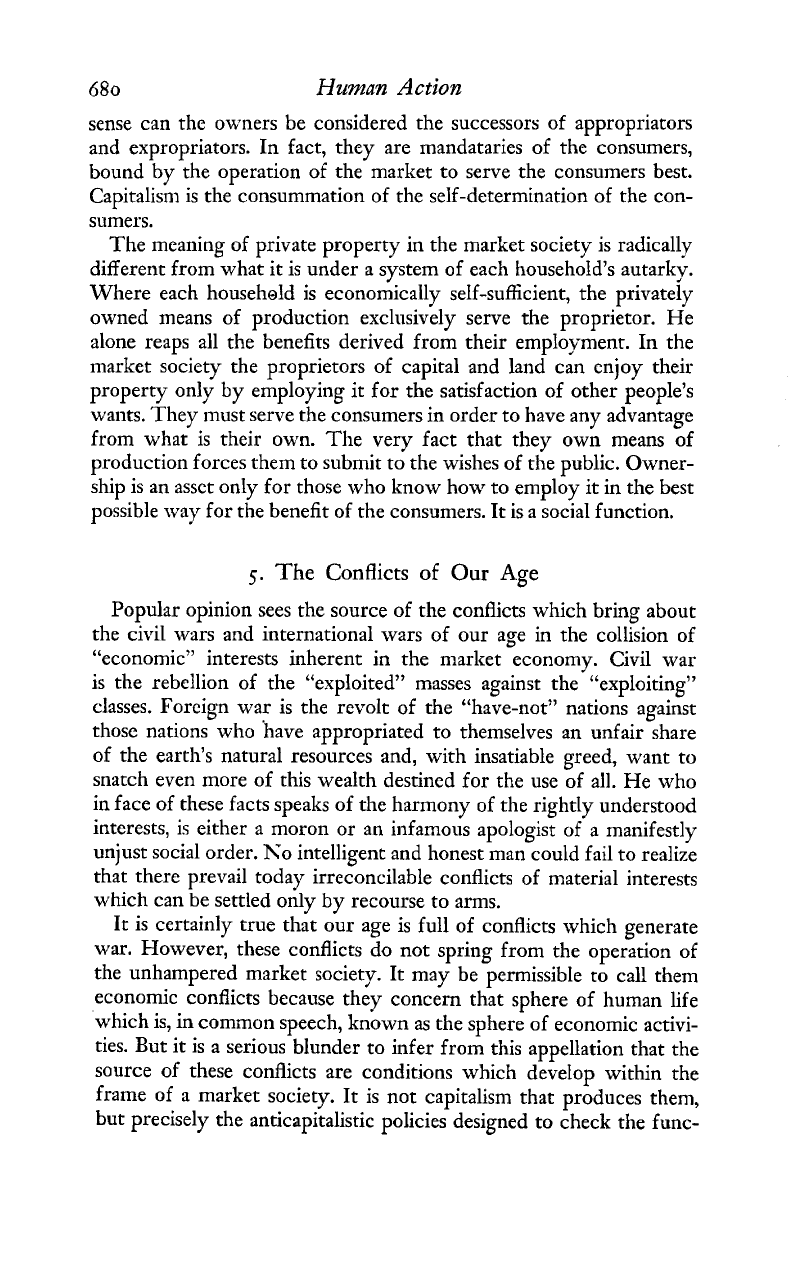
680
Human
Action
sense can the owners be considered the successors of appropriators
and expropriators. In fact, they are mandataries of the consumers,
bound by the operation of the market to serve the consumers best.
Capitalism is the consummation of the self-determination of the con-
sumers.
The meaning of private property in the market society is radically
different from what it is under a system of each household's autarky.
Where each househeld is economically seIf-sufficient, the privately
owned means of production exclusively serve the proprietor. He
alone reaps all the benefits derived from their employment. In the
market society the proprietors of capital and land can enjoy their
property only by employing it for the satisfaction of other people's
wants. They must serve the consumers in order to have any advantage
from what is their own. The very fact that they own means of
production forces them to submit to the wishes of the public. Owner-
ship is an asset only for those who know how to employ it in the best
possible way for the benefit of the consumers. It is a social function.
5.
The
Conflicts
of
Our
Age
Popular opinion sees the source of the conflicts which bring about
the civil wars and international wars of our age in the collision of
"economic" interests inherent in the market economy. Civil war
is the rebellion of the "exploited" masses against the "exploiting"
classes. Foreign war is the revolt of the "have-not" nations against
those nations who have appropriated to themselves an unfair share
of the earth's natural resources and, with insatiable greed, want to
snatch even more of this wealth destined for the use of all. He who
in face of these facts speaks of the harmony of the rightly understood
interests, is either a moron or an infamous apologist of a
manifestly
unjust social order. No intelligent and honest man could fail to realize
that there prevail today irreconcilable conflicts of material interests
which can be settied oniy by recourse to arms.
It is certainly true that our age is full of conflicts which generate
war. However, these conflicts do not spring from the operation of
the unhampered market society. It may be permissible to call them
economic conflicts because they concern that sphere of human life
which is, in common speech, known as the sphere of economic activi-
ties. But it is a serious blunder to infer from this appellation that the
source of these conflicts are conditions which develop within the
frame of a market society. It is not capitalism that produces them,
but precisely the anticapitalistic policies designed to check the func-
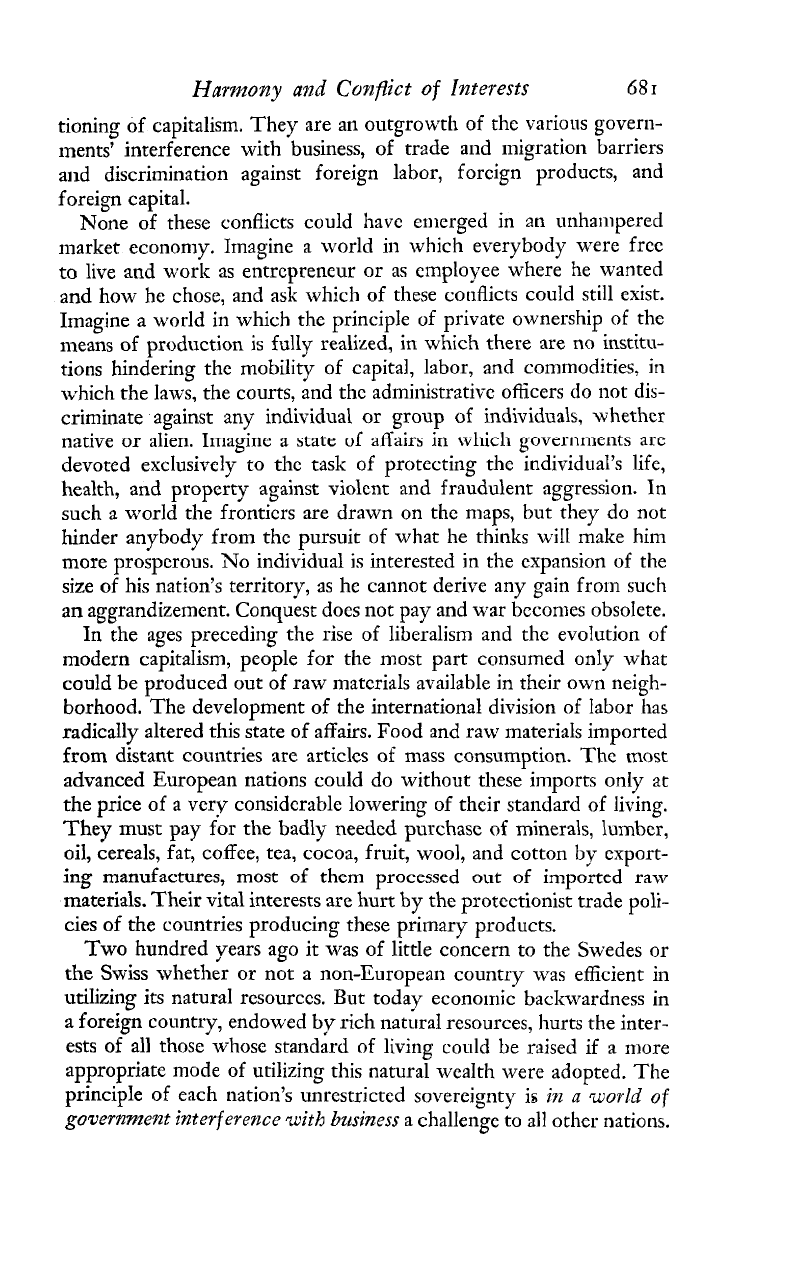
Harnzony
and
Coriflict
of
Interests
68
I
tioning of capitalism. They are an outgrowth of the various govern-
ments' interference with business, of trade and migration barriers
and discrimination against foreign labor, forcign products, and
foreign capital.
None of these conflicts could have emerged in an unhampered
rnarket economy. Imagine a world in which everybody were free
to live and work as entrcpreneur or as employee where he wanted
and how he chose, and ask which of these conflicts could still exist.
Irnagine a world in which
the
principle of private ownership of the
means of production is fully realized, in which there are no institu-
tions hindering the mobility of capital, labor, and commodities. in
which the laws, the courts, and thc adrninistrativc officers do not dih-
criminate against any individual or group of individuals, whether
native or alien. Imagine a state of affairs in which governments are
devoted exclusively to thc task of protecting the individual's life,
health, and property against violent and fraudulent aggression. In
such a world the frontiers are drawn on the maps, but they do not
hinder anybody from the pursuit of what he thinks wiI1 make him
more
prosperous.
No individual is interested in the expansion of the
size of his nation's territory, as he cannot derive any gain from such
an aggrandizement. Conquest docs not pay and war becomes obsolete.
In
the ages preceding the rise of libcralism and the evolution of
modern capitalism, people for the most part consumed only what
could be produced out of raw matcrials available in their own neigh-
borhood. The development of the international division of labor has
radically altered this state of affairs. Food and raw materials imported
from distant countries are articles of mass consumption. The most
advanced European nations could do without these imports only at
the price of a very considcratde lowering of their standard of living.
They must pay fbr the badly needed purchase
of
minerals, lumber,
oil, cereals,
fat,
coffce, tea, cocoa, fruit, wool, and cotton by cxport-
ing
manufactures, most of them processed out of imported raw
materials. Their vital interests are hurt by the protectionist trade poli-
cies of the countries producing these primary products.
Two hundred years ago it was of little concern to the Swedes or
the Swiss whether or not a non-European country was efficient in
utilizing its natural rcsourccs. But today economic backwardness in
a foreign country, endowed by rich natural resources, hurts the inter-
ests of all those w-hose standard of living could be raised if a more
appropriate mode of utilizing this natural wealth were adopted. The
principle of each nation's unrestricted sovereignty is
irz
a
world
of
government
interference
with
business
a challenge ;o all other nations.
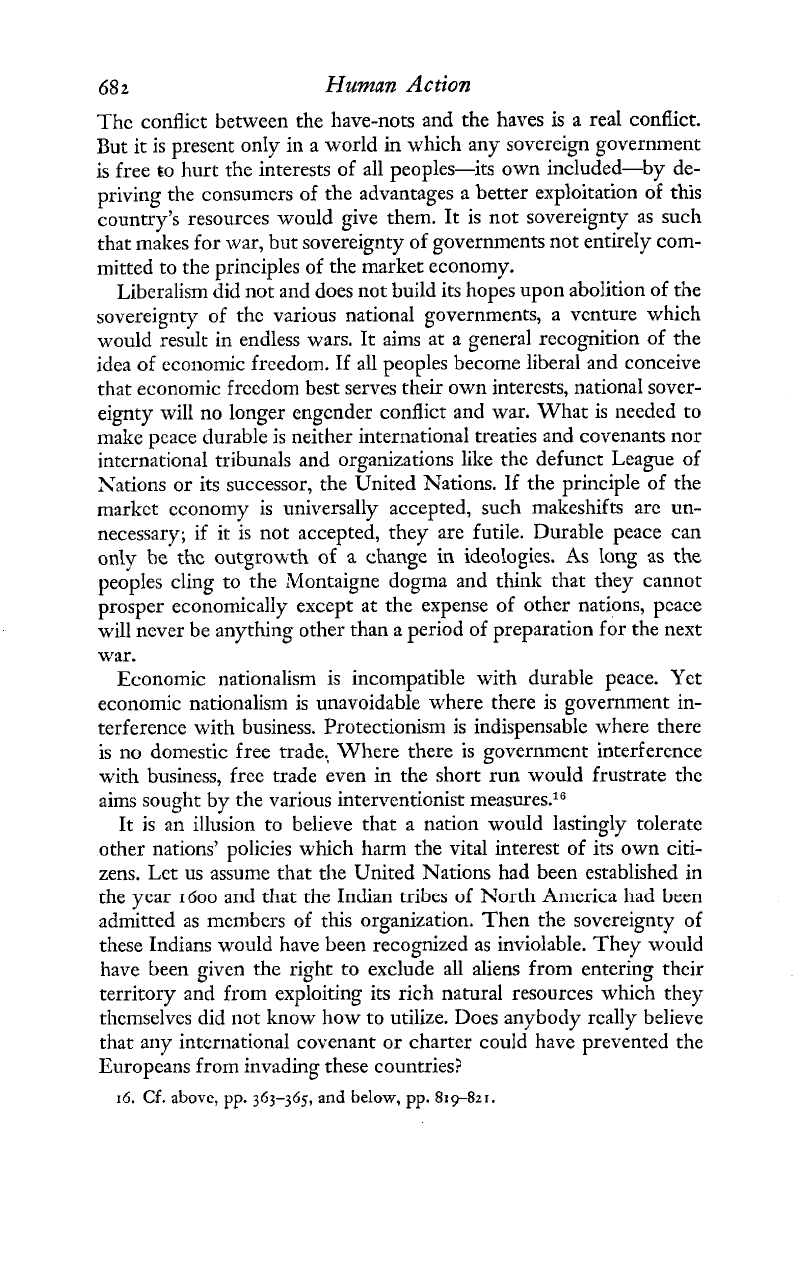
682
Human
Action
Thc conflict between the have-nots and the haves is a real conflict.
But
it
is present onIy in a world in which any sovereign government
is free
60
hurt the interests of all peoples-its own included-by de-
priving the
consumers
of the advantages a better exploitation of this
country's resources would give them. It is not sovereignty as such
that makes for war, but sovereignty of governments not entirely com-
mitted to the principles of the marker economy.
Liberalism
did
not and does not build its hopes upon abolition of the
sovereignty of the various national governments, a vcnture which
would result in endless wars. It aims at a general recognition of the
idea of economic frcedom. If all peoples become liberal and conceive
that economic frccdom best serves their own interests, national sover-
eignty will no longer engender conflict and war. What is needed to
make peace durable is neither international treaties and covenants nor
international tribunals and organizations like thc defunct League of
Nations or its successor, the United Nations. If the principle of the
markct cconomy is universally accepted, such makeshifts arc
un-
necessary; if it is not accepted, they are futile. Durable peace can
only
be
the outgrouth of
a
change
in
ideologies. As long as
the
peoples cling to the Montaigne dogma and think that they cannot
prosper economically except at the expense of other nations, peace
will ncver be anything other than a period of preparation for the next
war.
Economic nationalism is incompatible with durable peace. Yet
economic nationalism is unavoidable where there is government in-
terference with business. Protectionism is indispensable where there
is no domestic free trade., Where there is governmcnt interference
with business, free trade even in the short run would frustrate thc
aims sought by the various interventionist measures.16
It is
an
illusion to believe that a nation would lastingly tolerate
other nations' policies which harm the vital interest of its own citi-
zens. Let us assume that the United Nations had been established in
the year 1600 and that the Indian tribes of hTorth America had been
admitted as mcrnbers of this organization. Then the sovereignty of
these Indians would have been recognized as inviolable. They would
have been given the right to exclude all aliens from entering thcir
territory and from exploiting its rich natural resources which they
thcmselvcs did not know how to utilize. Does anybody rcally believe
that any international covenant or charter could have prevented the
Europeans from invading these countries?
16.
Cf.
above,
pp.
363-365,
and
below,
pp.
819--821.
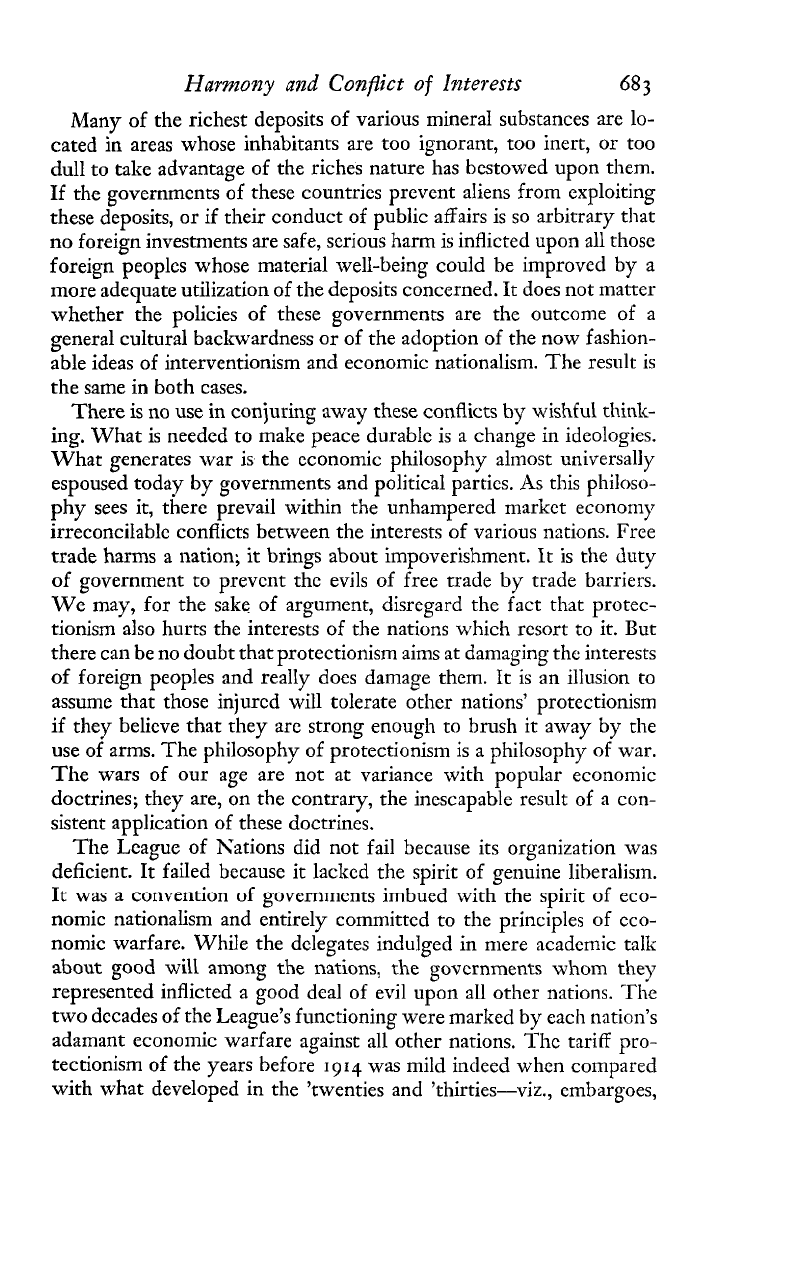
Harmony and
Conflict
of
Interests
683
Many of the richest deposits of various mineral substances are lo-
cated in areas whose inhabitants are too ignorant, too inert, or too
dull to take advantage of the riches nature has bestowed upon them.
If the governmcnts of these countries prevent aliens from exploiting
these deposits, or if their conduct of public affairs is so arbitrary that
no foreign investments are safe, serious harm is inflicted upon all those
foreign peoples whose material well-being could be improved by a
more adequate utilization of the deposits concerned. It does not matter
whether the policies of these governments are the outcome of a
general cultural backwardness or of the adoption of the now fashion-
able ideas of interventionism and economic nationalism. The result is
the same in both cases.
There is no use in conjuring away these conflicts
by
wishful
think-
ing. What is needed to make peace durable is a change in ideologies.
What generates war is the economic philosophy almost universally
espoused today by governments and political parties. As this philoso-
phy sees it, there prevail within the unhampered market economy
irreconciIable conflicts between the interests of various nztions. Free
trade harms a nation; it brings about impoverishment. It is the duty
of government to prevent the evils of free trade by trade barriers.
We may, for the sake of argument, disregard the fact that protec-
tionism also hurts the interests of the nations which resort to it. But
there can be no doubt that protectionism aims at damaging the interests
of foreign peoples and really does damage them.
It
is an illusion to
assume that those injured will tolerate other nations' protectionism
if they believe that they are strong enough to brush it away by the
use of arms. The philosophy of protectionism is a philosophy
of
war.
The wars of our age are not at variance with popular economic
doctrines; they are, on the contrary, the inescapable result of a con-
sistent application of these doctrines.
The League of Nations did not fail because its organization was
deficient. It failed because it lacked the spirit of genuine liberalism.
It
was a convention of governmcnts imbued with the spirit of eco-
nomic nationalism and entirely committed to the principles of eco-
nomic warfare. While the
delegates
indulged in mere academic talk
about
good
will among the nations, the governments whom they
represented inflicted a good deal of evil upon all other nations. The
two decades of the League's functioning were marked by each nation's
adamant economic warfare against all other nations. The tariff
pro-
tectionism of the years before
1914
was mild indeed when compared
with what developed in the 'twenties and 'thirties-viz., embargoes,
